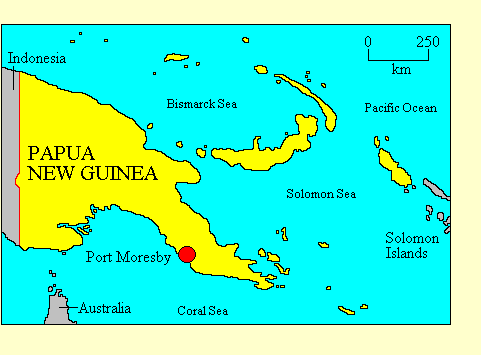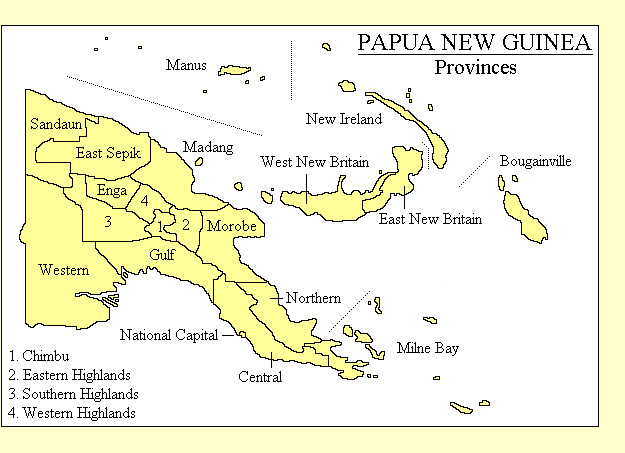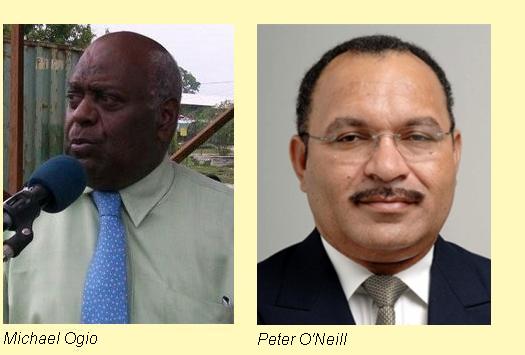
INDEPENDENT STATE OF
PAPUA NEW GUINEA
• Official name: Independent State of Papua New Guinea
• Location: Pacific
• International organisations: African, Caribbean and Pacific Group of States,
Asia-Pacific Economic Co-operation Forum, Commonwealth of Nations,
Non-Aligned Movement, Pacific Islands Forum, United Nations, World Trade Organisation
• Borders: Indonesia
• Coastline: Coral Sea, Pacific Ocean
• Land area: 462,840 Km2
• Population: 6,700,000
• Annual GDP (PPP) per capita: US$2,400 (2009 CIA estimate). World ranking: 144
• Ethnicity: Papua New Guinea is a very ethnically diverse country, but most of its
people are broadly speaking Melanesians. There are small Chinese and European minorities.

• Languages: English is the official language and the language of government,
business and the media. Papua New Guinea is probably the most linguistically diverse
country in the world, with over 800 languages spoken. The most widely used are Enga (3%), Melpa (3%),
Motu (3%), Kuman (2%), Wahgi (2%), Golin (1%), Huli (1%), Kamano (1%) and Kuana (1%).
A pidgin officially called Neo-Melanesian and unofficially called Tok Pisin (Pidgin Talk) is understood
by about 40% of the population and is now becoming established as a first language in some urban areas.
• Religion: Christian 66% (Catholic 22%, various Protestant denominations 44%),
indigenous beliefs 34%
• Form of government: Constitutional monarchy and parliamentary democracy.
Papua New Guinea is divided into 20 provinces.

• Capital: Port Moresby
• Constitution: The
Constitution of Papua New Guinea came into effect on 16 September 1975.
• Head of state: Elizabeth II, Queen of the United Kingdom since 1952, became
Queen and Head of State of Papua New Guinea from 16 September 1975 by virtue of the
Papua New Guinea Constitution. The Queen's functions in Papua New Guinea are
exercised by a Governor-General, appointed by the Queen on the advice of the
Prime Minister. The current Governor-General,
Michael Ogio, took office
on 20 December 2010.
• Head of government: The Prime Minister, appointed by the Governor-General. The
Prime Minister is the leader of the majority coalition in the legislature and
is accountable to it.
• Legislature: Papua New Guinea has a unicameral legislature, the
National Parliament, which has
109 members elected for five-year terms from single-member constituencies. The large numbers of
candidates for each seat means that election is largely a matter of chance - candidates are frequently
elected with 5 or 10% of the vote.
• Electoral authority: The Papua New Guinea Electoral Commission
administers national elections
• Freedom House 2009 rating: Political Rights 4, Civil Liberties 3
Political history
The southern part of what is now Papua New Guinea was annexed by Britain in 1884,
mainly to forestall the Germans, who were about the annex the northern section and
adjacent islands. In 1901 Britain handed administration of the Territory of Papua to
the newly-federated Australian Commonwealth. Australia neglected the territory for
many years. In 1914 Australian troops occupied German New Guinea, and in 1919
this territory was made a Leage of Nations Mandate under Australian administration.
Henceforth Australia administered both territories as one colony.

Most of New Guinea was occupied by the Japanese from 1941 to 1945,
although they were prevented from reaching the south coast. After the war
development proceeded more rapidly under pressure from the United Nations.
Legislative instututions were introduced in 1964, and internal self-government in
1972. In 1975 Papua New Guinea became an independent state.
Since independence PNG has been hampered by regional and linguistic
disunity, corruption and poor administration, and by an
overly-complex constitution and an electoral system which fosters irresponsibility and corruption.
PNG politics were dominated for over 30 years by the veteran nationalist leader Michael Somare, who was
Prime Minister several times, most recently from 2002 until August 2011, when ill-health
forced his retirement. He was succeeded by Peter O'Neill.
Thanks to its dysfunctional electoral system, PNG has a very weak party system, with a
multitude of parties mainly representing tribal or personal loyalties. The most important is O'Neill's
National Alliance Party.
Freedom House's 2009
report on Papua New Guinea
says: "Papua New Guinea is an electoral democracy. Nevertheless, the most recent elections in 2007
were marred by reports of irregularities, fraud, and violence... Corruption and abuse of office are
severe problems. Although a number of high-profile corruption cases are pursued each year, comprehensive
reforms to increase transparency and the rule of law have not occurred. In April 2008, the Auditor
General stated that corrupt officials have stolen approximately $318 million annually in recent years.
Several prominent officials were involved in corruption scandals during 2008, including Prime Minister
Michael Somare, who was implicated in May for involvement in the disappearance of $30 million in
assistance from Taiwan. PNG ranked 151 out of 180 countries surveyed in Transparency
International's 2008 Corruption Perceptions Index... Freedom of speech is generally respected. The media
provide independent coverage and report on controversial issues such as alleged abuses by police, official
corruption, and the views of the political opposition... The constitution provides for freedom of association,
and the government generally observes this right in practice... The judiciary is independent."
Updated September 2011
|

